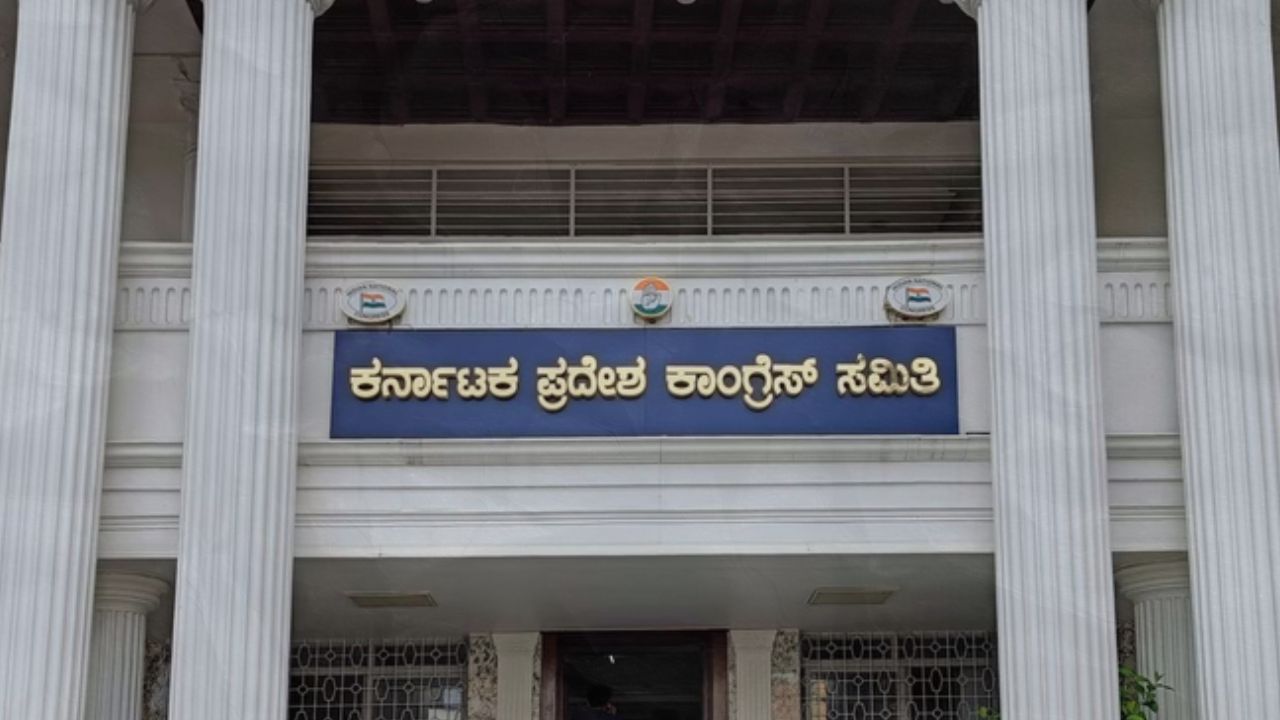Tamil Nadu Education Minister Anbil Mahesh had earlier claimed that over 90,000 students in Karnataka had failed board exams due to language imposition.
Published Jun 29, 2025 | 5:56 PM ⚊ Updated Jun 29, 2025 | 5:56 PM

Karnataka Pradesh Congress Committe office in Bengaluru
Synopsis: The Karnataka Congress on Sunday criticised the Union government’s three-language policy, calling it a threat to India’s linguistic diversity and regional identities, especially in non-Hindi-speaking states like Karnataka. The party said the policy imposes an additional burden on students and undermines federal principles. It called for a more inclusive approach that respects regional languages.
The Karnataka unit of the Congress on Sunday, 29 June, criticised the Union government’s three-language policy, terming it a threat to India’s linguistic diversity, and stating that it not only undermines regional identities but also imposes an unnecessary burden on students who are otherwise performing well academically.
Referring to Tamil Nadu Education Minister Anbil Mahesh Poyyamozhi’s comments on Friday, in which he claimed that over 90,000 students in Karnataka had failed their board exams due to language imposition, the Congress said in a post on X:
“South India’s linguistic diversity is a vibrant tapestry, weaving together languages like Kannada, Kodava, Tulu, Konkani, Tamil, Telugu, Malayalam, and many others.
“However, mandating Hindi as a third language in schools, especially in non-Hindi-speaking states like Karnataka, creates discord. For speakers of Kannada, Tulu, or Kodava who are fluent in Kannada and English, struggling with written Hindi is a significant challenge – a sentiment shared by many students in linguistically rich regions. This issue transcends a single language; it’s about fairness and embracing our diversity.”
The party further criticised the tendency to label any criticism of the National Education Policy or Hindi imposition as ‘anti-national.’
“Voices like DK Suresh highlight the marginalisation of South India. Instead of fostering dialogue, some BJP leaders, in an attempt to appease central leaders, brand him ‘anti-national.’ This stifles a crucial conversation: India’s strength lies in its mosaic of cultures and languages, not in a one-size-fits-all language policy,” it said.
“Forcing Hindi can hinder students who excel in other areas, dimming their potential. We need dynamic, inclusive language policies that honour local identities, empowering students to master regional languages like Kannada or Tamil while offering Hindi as an option, not a mandate.”
The statement continued:
“Let’s build an education system that amplifies every voice, celebrating India’s diversity as its greatest asset.”
South India’s linguistic diversity is a vibrant tapestry, weaving together languages like Kannada, Kodava, Tulu, Konkani, Tamil, Telugu, Malayalam, and many others. However, mandating Hindi as a third language in schools, especially in non-Hindi-speaking states like Karnataka,… pic.twitter.com/4KgaVX9kb6
— Karnataka Congress (@INCKarnataka) June 29, 2025
Mahesh Poyyamozhi had earlier stressed that language should be a matter of choice, not compulsion.
“A third language should be an option, not a compulsion. The Centre is threatening states by choking education funds. But Chief Minister Stalin has stepped in and assured that the state will bear the full cost,” he said on Friday, as reported by India Today.
The National Education Policy (NEP), introduced by the Centre in 2020, continues to face sharp criticism from southern states, particularly Karnataka, Tamil Nadu, and Kerala.
These states have repeatedly expressed concern that the NEP seeks to impose Hindi at the cost of regional languages, undermining local culture and educational autonomy.
On 5 February, Karnataka Deputy Chief Minister DK Shivakumar called for collective pressure on the Union government to withdraw the policy. “We need to protect our federal structure and our languages. The NEP is not suited for Karnataka or for other southern states,” he said while addressing reporters in Bengaluru.
Tamil Nadu, which has a long history of opposing Hindi imposition, has remained among the most vocal critics. On 23 May, the Union government informed the Madras High Court that funds for the 25 percent quota for underprivileged students had not been allocated to Tamil Nadu, citing the state’s refusal to sign a Memorandum of Understanding (MoU) on the NEP.
Academics have also raised objections to some of the NEP’s proposed content. Early drafts suggested the inclusion of Vedic mathematics, the Arthashastra, and the Pancha Bhoota theory in school syllabi, while reportedly casting doubt on well-established scientific concepts such as the Pythagorean theorem. These suggestions drew strong criticism from educators, who said they risk undermining scientific temper and academic rigour.
In Karnataka’s capital, Bengaluru, language-related tensions frequently spill over into public life. Social media often witnesses debate over the absence of Kannada in signage, hoardings, and essential services like banks, reflecting deeper anxieties over linguistic marginalisation.
Meanwhile, Union Home Minister Amit Shah stirred controversy on 19 June with remarks at a book launch event, where he declared that English would soon lose relevance and that Indians who speak the language will one day feel “ashamed.”
“There is no crisis [with regard to Hindi]. Remember my words, and listen carefully. In our lifetimes, in this country, those who speak English will feel ashamed. The creation of such a society is not very far. Only those people are able to do things who resolve to do them. The languages of our country are the jewels of our culture. Without our languages, we cease to be truly Indian,” Shah said.
“To understand our country, our culture, our history, and our religion, no foreign language can suffice. The idea of a complete India cannot be imagined through half-baked foreign languages.”
(Edited by Dese Gowda)
